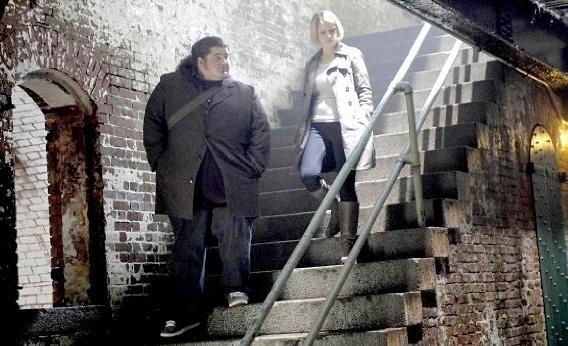From the 1993 debut of The X-Files through our age of the lunatic Fringe, Fox has nursed a crush, often a productive one, on supernatural procedurals. Hallmarks of the form include paranormal happenings, paradoxical schemes for world domination, and para-governmental agents sharing spooked glares in the green glow of computer monitors. Alcatraz (debuts Monday at 8 p.m. ET) moves through this subgenre’s paces at a decent clip, conveys a measure of suspense—and yet still left this viewer feeling mildly drowsy. No small part of the show’s soporific quality owes to its visual hush—the dimness of its lighting. In common with its predecessors, Alcatraz unfolds amid a cinematographic gloaming meant to suggest a perpetual twilight zone of the soul.
The premise: In 1963, just as Alcatraz Island was closing as a federal prison, its inmates vanished as if hoovered out of this dimension by a paranormal vacuum, and the Bureau of Prisons managed to keep this on the down low. Four decades later, the disappeared prisoners are rematerializing to settle personal scores and to nudge along a grand scheme, presumably nefarious, though the series’ debut is sketchy about its aims. Because Alcatraz issues from J.J. Abrams’ production company and because its creators include Elizabeth Sarnoff, a producer on Abrams’ Lost, we should not expect the show to adjust the dimmer switch of lucidity anytime soon.
In the first half of Alcatraz’s double-header premiere, a long-ago inmate named Jack Sylvane wakes from a nap inside a cell, spooking a little girl on a tour but otherwise causing no fuss. Then Sylvane boards the ferry back into San Francisco and goes about his business, which involves murdering the elderly ex-warden who gave him so much grief back in the day when he was just a Jean Valjean who’d lurched into doing hard time. The series passes on the opportunity to note Jack’s culture shock; there are no Rip-Van-Wrinkle-in-Time double-takes at technology or sexuality or Starbucks. This is possibly a shrewd move on the show’s part. Sci-fi of this particular ilk is well-advised not to introduce any more hokum than necessary and to avoid squinting very hard at reality. Besides, the show’s priorities do not include the making of mirth. Alcatraz is dour by design.
While Jack is busy not having his mind blown by iPhones and jeggings, police detective Rebecca Madsen (played by Sarah Jones) is on his tail. Early on, we see Rebecca’s partner suffer a fatal fall during a rooftop chase. The series, eager to get on with things, suggests that she’s slightly haunted by this but mostly annoyed. The response says something about both the performance—Jones’ focus on keeping things snappy—and about where the writers have placed their emphasis. I think that they think that the audience wants to see a girl with a gun blondly battle the forces of darkness but that we aren’t in any rush to get to know her. There are hints of troubled depths to Rebecca’s psyche, and her scenes with her gruff-but-gentle mentor (played by Robert Forster) suggest promise, but it will be a while before she develops into something more than a Law Enforcement Barbie straight out of the doesn’t-play-by-the-book playbook.
Because Jack’s warden victim was a federal employee, the feds try to snatch the case away from Rebecca. Specifically, it falls under the jurisdiction of Sam Neill, who puts his authoritative hair and soft air of establishment menace to work as one Emerson Hauser, precisely the name you’d expect an agent, especially an ambiguously motivated one, to bear on a show such as this. According to protocol, Rebecca regards him with a compound of awe, suspicion, and condescension, but she gets along swimmingly with Diego Soto, an academic expert on Alcatraz whom she recruits as a deputy.
Soto helps the mood of the show with his wry attitude and occasional gee-whiz-ardry, and he helps to move the plot along by stating facts that Rebecca would otherwise have to pause and look up. As played by Jorge Garcia—the performer popularly known as the fat guy from Lost—Soto is, if not the best thing on Alcatraz, at least the most fun. Despite or because of the fact that he holds two doctorates, this wry fellow makes a living running a store that sells graphic novels and the like. Thus, in vocation and avoirdupois, he suggests a being from another planet in the Fox universe. He feels like a warmer version of The Simpsons’ Comic Book Guy. The heavy fellow lets in some much-needed light.
